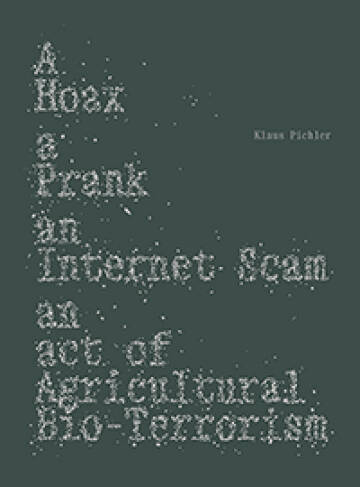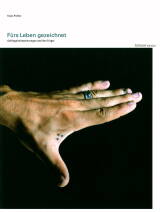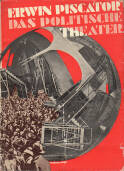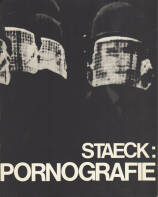A hoax, a prank, an internet scam, an act of agricultural bio-terrorism (signed)
by Klaus Pichler
Photographs: Klaus Pichler
Text: Klaus Pichler
Publisher: self-published in collaboration with Nearest Truth Editions
110 pages
Pictures: 65 color photographs
Year: 2023
Price: 49.50 €
Comments: first edition, 2023. Limited to 350 copies. Graphic design: Roland Hörmann/ phospho.at . English. Printed with TEA Design, Sofia, Bulgaria. Cover: Viro Products, Barendrecht, Netherlands. printed on Arctic Volume 175g coated paper, hardbound. Book: hardcover, 22 x 28cm
In July 2020, more than 85.000 US households received packages from China, containing small bags with unsolicited plant seeds. Those ‘mystery seeds’ sparked biosecurity concerns, and the US Department of Agriculture (USDA) warned people not to plant them. Kentucky’s agriculture commissioner Ryan Quarles (R) informed the public: ‘we don’t have enough information to know if this is a hoax, a prank, an internet scam or an act of agricultural bio-terrorism’.
Alongside the official investigation, conservative media and conspiracy theorists entered the discourse with their interpretation of the ‘mystery seeds‘ case. Overshadowed by the COVID-19 pandemic and driven by anti-Chinese sentiment in the heated pre-election period, they claimed the distribution of unsolicited seeds was an attempt of a biological attack. FOX News anchorman Tucker Carlson even suspected they were part of ‘China’s plan to destroy the United States.’
In February 2021, the USDA announced the final results of the investigation on 19,813 packages of unsolicited seeds, which had been sent in by people from all states and contained 515 different species of plants. The actual cause for the unsolicited seeds was identified as a fraud scheme called ‘brushing scam’, used by Chinese online marketplace sellers to boost their seller rankings. There, the search ranking algorithm of online marketplaces is exploited by sending cheap products to stolen addresses and then submitting positive reviews on the unwitting receiver’s behalf.
Based on this understanding, the USDA report stated that there was ‘no evidence that someone was intentionally trying to harm U.S. agriculture with these shipments’. However, the ‘mystery seeds’ case has found its place among conspiracy myths and is still a subject of debate in relevant forums.
The book ‘A hoax, a prank, an internet scam, an act of agricultural bio-terrorism’ investigates the unfolding of the ‘mystery seeds’ case and examines the mechanisms behind the emergence of conspiracy myths and the role of social media in their dissemination. Using the contents of 200 packets from various Chinese online marketplaces, the focus is on the involuntary protagonists of the case: the plant seeds. They are depicted in different stages of growth from seed to seedling to plant, and thus serve as a visual metaphor for how unsubstantiated assumptions can grow into ‘alternative facts’. The images are contrasted by screenshots from social networks and quotes, giving insights into the psychology behind conspiracy myths, the dynamics of the ‘post-truth era’ and both the manipulative potential and political impact of social media.
More books by Klaus Pichler
-
Fürs Leben gezeichnet (signed - last copy)
by Klaus Pichler
sold out -
Skeletons in the Closet (special edition, signed + framed prin...
by Klaus Pichler
sold out -
Skeletons in the Closet (signed - last copy)
by Klaus Pichler
sold out -
One Third (signed)
by Klaus Pichler
Euro 22 -
One Third (signed + print - last copies)
by Klaus Pichler
Euro 220 -
Just the Two of Us (signed - single copy)
by Klaus Pichler
Euro 250 -
Just the Two of Us (signed + print)
by Klaus Pichler
sold out -
DUST (signed)
by Klaus Pichler
Euro 48 -
DUST (book + print)
by Klaus Pichler
Euro 250 -
Golden days before they end (signed - English)
by Klaus Pichler
sold out -
Golden days before they end (first German edition - signed)
by Klaus Pichler
sold out -
Golden days before they end (signed - German)
by Klaus Pichler
Euro 58 -
This will change your life forever (signed poster)
by Klaus Pichler
Euro 49 -
This will change your life forever (signed)
by Klaus Pichler
Euro 45 -
The Petunia Carnage (signed - last copy)
by Klaus Pichler
sold out -
Golden days before they end (English edition)
by Klaus Pichler
Euro 58 -
Skeletons in the Closet (special edition, signed + print)
by Klaus Pichler
sold out -
Golden days before they end (English edition) - used copy
by Klaus Pichler
Euro 58 46.40 -
Fear Guards the Lemon Grove (signed)
by Klaus Pichler
Euro 40
more books tagged »China« | >> see all
-
Dream Machine
by Ruben Lundgren
Euro 66 -
How Was Your Dream?
by Thaddé Comar
sold out -
The Land Between Us
by Ning Kai and Sabrina Scarpa
Euro 56 -
Steles - Huang Yi Project (last copy)
by Taca Sui
sold out -
Sample Room (review copy)
by Chen Jiagang
Euro 79 63.20 -
east - west (special offer! - 2 books)
by Regina Maria Anzenberger
Euro 98
more books tagged »Austrian« | >> see all
-
Roots & Waltz (book + print)
by Regina Anzenberger
Euro 180 -
Shifting Roots (collector's edition)
by Regina Anzenberger
Euro 220 -
postcards
by Regina Anzenberger
Euro 15 -
Under the Apple Tree (collector's edition)
by Regina Anzenberger
Euro 148 -
Gstettn - Snails
by Regina Anzenberger
Euro 35 -
Anwesend Abwesend
by Michaela Moscouw
Euro 28
more books tagged »America« | >> see all
-
The Father Box (signed)
by Rob McDonald
Euro 50 -
Swimmers
by Larry Sultan
Euro 66 -
Gathered Leaves Annotated (signed)
by Alec Soth
Euro 66 -
Poplar Forest (signed + print)
by Rob McDonald
Euro 55 -
Beautiful, Still (signed)
by Colby Deal
Euro 60.50 -
A Geography of Abandonment (special edition - book + print)
by Raymond Meeks
Euro 800
more books tagged »science« | >> see all
-
Finding Homer
by Eva Tomei
Euro 25 -
The Last Conversation with Academician Sakharov (signed)
by Agnieszka Rayss
Euro 33 -
Altered Ocean (signed)
by Mandy Barker
sold out
Random selection from the Virtual bookshelf josefchladek.com
A hoax, a prank, an internet scam, an act of agricultural bio-terrorism (signed)
by Klaus Pichler
Photographs: Klaus Pichler
Text: Klaus Pichler
Publisher: self-published in collaboration with Nearest Truth Editions
110 pages
Pictures: 65 color photographs
Year: 2023
Price: 49.50 €
Comments: first edition, 2023. Limited to 350 copies. Graphic design: Roland Hörmann/ phospho.at . English. Printed with TEA Design, Sofia, Bulgaria. Cover: Viro Products, Barendrecht, Netherlands. printed on Arctic Volume 175g coated paper, hardbound. Book: hardcover, 22 x 28cm
In July 2020, more than 85.000 US households received packages from China, containing small bags with unsolicited plant seeds. Those ‘mystery seeds’ sparked biosecurity concerns, and the US Department of Agriculture (USDA) warned people not to plant them. Kentucky’s agriculture commissioner Ryan Quarles (R) informed the public: ‘we don’t have enough information to know if this is a hoax, a prank, an internet scam or an act of agricultural bio-terrorism’.
Alongside the official investigation, conservative media and conspiracy theorists entered the discourse with their interpretation of the ‘mystery seeds‘ case. Overshadowed by the COVID-19 pandemic and driven by anti-Chinese sentiment in the heated pre-election period, they claimed the distribution of unsolicited seeds was an attempt of a biological attack. FOX News anchorman Tucker Carlson even suspected they were part of ‘China’s plan to destroy the United States.’
In February 2021, the USDA announced the final results of the investigation on 19,813 packages of unsolicited seeds, which had been sent in by people from all states and contained 515 different species of plants. The actual cause for the unsolicited seeds was identified as a fraud scheme called ‘brushing scam’, used by Chinese online marketplace sellers to boost their seller rankings. There, the search ranking algorithm of online marketplaces is exploited by sending cheap products to stolen addresses and then submitting positive reviews on the unwitting receiver’s behalf.
Based on this understanding, the USDA report stated that there was ‘no evidence that someone was intentionally trying to harm U.S. agriculture with these shipments’. However, the ‘mystery seeds’ case has found its place among conspiracy myths and is still a subject of debate in relevant forums.
The book ‘A hoax, a prank, an internet scam, an act of agricultural bio-terrorism’ investigates the unfolding of the ‘mystery seeds’ case and examines the mechanisms behind the emergence of conspiracy myths and the role of social media in their dissemination. Using the contents of 200 packets from various Chinese online marketplaces, the focus is on the involuntary protagonists of the case: the plant seeds. They are depicted in different stages of growth from seed to seedling to plant, and thus serve as a visual metaphor for how unsubstantiated assumptions can grow into ‘alternative facts’. The images are contrasted by screenshots from social networks and quotes, giving insights into the psychology behind conspiracy myths, the dynamics of the ‘post-truth era’ and both the manipulative potential and political impact of social media.
More books by Klaus Pichler
-
Fürs Leben gezeichnet (signed - last copy)
by Klaus Pichler
sold out -
Skeletons in the Closet (special edition, signed + framed prin...
by Klaus Pichler
sold out -
Skeletons in the Closet (signed - last copy)
by Klaus Pichler
sold out -
One Third (signed)
by Klaus Pichler
Euro 22 -
One Third (signed + print - last copies)
by Klaus Pichler
Euro 220 -
Just the Two of Us (signed - single copy)
by Klaus Pichler
Euro 250 -
Just the Two of Us (signed + print)
by Klaus Pichler
sold out -
DUST (signed)
by Klaus Pichler
Euro 48 -
DUST (book + print)
by Klaus Pichler
Euro 250 -
Golden days before they end (signed - English)
by Klaus Pichler
sold out -
Golden days before they end (first German edition - signed)
by Klaus Pichler
sold out -
Golden days before they end (signed - German)
by Klaus Pichler
Euro 58 -
This will change your life forever (signed poster)
by Klaus Pichler
Euro 49 -
This will change your life forever (signed)
by Klaus Pichler
Euro 45 -
The Petunia Carnage (signed - last copy)
by Klaus Pichler
sold out -
Golden days before they end (English edition)
by Klaus Pichler
Euro 58 -
Skeletons in the Closet (special edition, signed + print)
by Klaus Pichler
sold out -
Golden days before they end (English edition) - used copy
by Klaus Pichler
Euro 58 46.40 -
Fear Guards the Lemon Grove (signed)
by Klaus Pichler
Euro 40
more books tagged »China« | >> see all
-
Dream Machine
by Ruben Lundgren
Euro 66 -
How Was Your Dream?
by Thaddé Comar
sold out -
The Land Between Us
by Ning Kai and Sabrina Scarpa
Euro 56 -
Steles - Huang Yi Project (last copy)
by Taca Sui
sold out -
Sample Room (review copy)
by Chen Jiagang
Euro 79 63.20 -
east - west (special offer! - 2 books)
by Regina Maria Anzenberger
Euro 98
more books tagged »Austrian« | >> see all
-
Roots & Waltz (book + print)
by Regina Anzenberger
Euro 180 -
Shifting Roots (collector's edition)
by Regina Anzenberger
Euro 220 -
postcards
by Regina Anzenberger
Euro 15 -
Under the Apple Tree (collector's edition)
by Regina Anzenberger
Euro 148 -
Gstettn - Snails
by Regina Anzenberger
Euro 35 -
Anwesend Abwesend
by Michaela Moscouw
Euro 28
more books tagged »America« | >> see all
-
The Father Box (signed)
by Rob McDonald
Euro 50 -
Swimmers
by Larry Sultan
Euro 66 -
Gathered Leaves Annotated (signed)
by Alec Soth
Euro 66 -
Poplar Forest (signed + print)
by Rob McDonald
Euro 55 -
Beautiful, Still (signed)
by Colby Deal
Euro 60.50 -
A Geography of Abandonment (special edition - book + print)
by Raymond Meeks
Euro 800
more books tagged »science« | >> see all
-
Finding Homer
by Eva Tomei
Euro 25 -
The Last Conversation with Academician Sakharov (signed)
by Agnieszka Rayss
Euro 33 -
Altered Ocean (signed)
by Mandy Barker
sold out
Random selection from the Virtual bookshelf josefchladek.com
A hoax, a prank, an internet scam, an act of agricultural bio-terrorism (signed)
by Klaus Pichler
Photographs: Klaus Pichler
Text: Klaus Pichler
Publisher: self-published in collaboration with Nearest Truth Editions
110 pages
Pictures: 65 color photographs
Year: 2023
Price: 49.50 €
Comments: first edition, 2023. Limited to 350 copies. Graphic design: Roland Hörmann/ phospho.at . English. Printed with TEA Design, Sofia, Bulgaria. Cover: Viro Products, Barendrecht, Netherlands. printed on Arctic Volume 175g coated paper, hardbound. Book: hardcover, 22 x 28cm
In July 2020, more than 85.000 US households received packages from China, containing small bags with unsolicited plant seeds. Those ‘mystery seeds’ sparked biosecurity concerns, and the US Department of Agriculture (USDA) warned people not to plant them. Kentucky’s agriculture commissioner Ryan Quarles (R) informed the public: ‘we don’t have enough information to know if this is a hoax, a prank, an internet scam or an act of agricultural bio-terrorism’.
Alongside the official investigation, conservative media and conspiracy theorists entered the discourse with their interpretation of the ‘mystery seeds‘ case. Overshadowed by the COVID-19 pandemic and driven by anti-Chinese sentiment in the heated pre-election period, they claimed the distribution of unsolicited seeds was an attempt of a biological attack. FOX News anchorman Tucker Carlson even suspected they were part of ‘China’s plan to destroy the United States.’
In February 2021, the USDA announced the final results of the investigation on 19,813 packages of unsolicited seeds, which had been sent in by people from all states and contained 515 different species of plants. The actual cause for the unsolicited seeds was identified as a fraud scheme called ‘brushing scam’, used by Chinese online marketplace sellers to boost their seller rankings. There, the search ranking algorithm of online marketplaces is exploited by sending cheap products to stolen addresses and then submitting positive reviews on the unwitting receiver’s behalf.
Based on this understanding, the USDA report stated that there was ‘no evidence that someone was intentionally trying to harm U.S. agriculture with these shipments’. However, the ‘mystery seeds’ case has found its place among conspiracy myths and is still a subject of debate in relevant forums.
The book ‘A hoax, a prank, an internet scam, an act of agricultural bio-terrorism’ investigates the unfolding of the ‘mystery seeds’ case and examines the mechanisms behind the emergence of conspiracy myths and the role of social media in their dissemination. Using the contents of 200 packets from various Chinese online marketplaces, the focus is on the involuntary protagonists of the case: the plant seeds. They are depicted in different stages of growth from seed to seedling to plant, and thus serve as a visual metaphor for how unsubstantiated assumptions can grow into ‘alternative facts’. The images are contrasted by screenshots from social networks and quotes, giving insights into the psychology behind conspiracy myths, the dynamics of the ‘post-truth era’ and both the manipulative potential and political impact of social media.
More books by Klaus Pichler
-
Fürs Leben gezeichnet (signed - last copy)
by Klaus Pichler
sold out -
Skeletons in the Closet (special edition, signed + framed prin...
by Klaus Pichler
sold out -
Skeletons in the Closet (signed - last copy)
by Klaus Pichler
sold out -
One Third (signed)
by Klaus Pichler
Euro 22 -
One Third (signed + print - last copies)
by Klaus Pichler
Euro 220 -
Just the Two of Us (signed - single copy)
by Klaus Pichler
Euro 250 -
Just the Two of Us (signed + print)
by Klaus Pichler
sold out -
DUST (signed)
by Klaus Pichler
Euro 48 -
DUST (book + print)
by Klaus Pichler
Euro 250 -
Golden days before they end (signed - English)
by Klaus Pichler
sold out -
Golden days before they end (first German edition - signed)
by Klaus Pichler
sold out -
Golden days before they end (signed - German)
by Klaus Pichler
Euro 58 -
This will change your life forever (signed poster)
by Klaus Pichler
Euro 49 -
This will change your life forever (signed)
by Klaus Pichler
Euro 45 -
The Petunia Carnage (signed - last copy)
by Klaus Pichler
sold out -
Golden days before they end (English edition)
by Klaus Pichler
Euro 58 -
Skeletons in the Closet (special edition, signed + print)
by Klaus Pichler
sold out -
Golden days before they end (English edition) - used copy
by Klaus Pichler
Euro 58 46.40 -
Fear Guards the Lemon Grove (signed)
by Klaus Pichler
Euro 40
more books tagged »China« | >> see all
-
Dream Machine
by Ruben Lundgren
Euro 66 -
How Was Your Dream?
by Thaddé Comar
sold out -
The Land Between Us
by Ning Kai and Sabrina Scarpa
Euro 56 -
Steles - Huang Yi Project (last copy)
by Taca Sui
sold out -
Sample Room (review copy)
by Chen Jiagang
Euro 79 63.20 -
east - west (special offer! - 2 books)
by Regina Maria Anzenberger
Euro 98
more books tagged »Austrian« | >> see all
-
Roots & Waltz (book + print)
by Regina Anzenberger
Euro 180 -
Shifting Roots (collector's edition)
by Regina Anzenberger
Euro 220 -
postcards
by Regina Anzenberger
Euro 15 -
Under the Apple Tree (collector's edition)
by Regina Anzenberger
Euro 148 -
Gstettn - Snails
by Regina Anzenberger
Euro 35 -
Anwesend Abwesend
by Michaela Moscouw
Euro 28
more books tagged »America« | >> see all
-
The Father Box (signed)
by Rob McDonald
Euro 50 -
Swimmers
by Larry Sultan
Euro 66 -
Gathered Leaves Annotated (signed)
by Alec Soth
Euro 66 -
Poplar Forest (signed + print)
by Rob McDonald
Euro 55 -
Beautiful, Still (signed)
by Colby Deal
Euro 60.50 -
A Geography of Abandonment (special edition - book + print)
by Raymond Meeks
Euro 800
more books tagged »science« | >> see all
-
Finding Homer
by Eva Tomei
Euro 25 -
The Last Conversation with Academician Sakharov (signed)
by Agnieszka Rayss
Euro 33 -
Altered Ocean (signed)
by Mandy Barker
sold out
Random selection from the Virtual bookshelf josefchladek.com




























































;jpg?c=ff33816574d1d0254cb7d1d5de5047a6)






;jpg?c=8e03d10a03fa1b04c2ec5bad8cebd48b)

;jpg?c=7f2cc7a8f1f906ae6eea50f076b89cea)


;jpg?c=da946a13da0648642693b2384b444174)

;jpg?c=143f1b8782ccebc4060e1c0327044727)